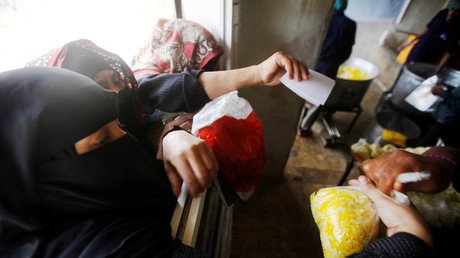The Saudi-led coalition is reportedly seeking direct US support to recapture the port city of Hodeidah in Yemen. The battle for the humanitarian lifeline would spell disaster for the locals, human rights agencies warn.
For nearly a week, the Saudi-led coalition forces have been preparing to launch a large-scale offensive on Hodeidah, the fourth-largest city in Yemen, with a population of 400,000 people, in an effort to recapture the city's port which currently serves as one of the remaining humanitarian lifelines in the war-stricken country. However, before cutting what they call the "vein that the Houthis are benefiting from," the coalition decided to seek US support, the Wall Street Journal (WSJ) reported on Sunday.
According to anonymous US officials familiar with the issue, the United Arab Emirates approached Washington with the request. Secretary of State Mike Pompeo is now waiting for a "quick assessment" of the UAE's plea, which seeks US intelligence capabilities, mainly drone overflights, to help a Saudi-led coalition retake Hodeidah. Washington's potential involvement has excited a number of US officials and has left others worried about the potential consequences of such an operation. While the US is weighing its options, the UAE and Saudi Arabian officials have allegedly assured the US that they will stay clear of the port.
Recapturing Hodeidah and its port is crucial for Saudi Arabia. Over the course of the conflict, Riyadh has repeatedly tried to blockade the docks, claiming that the port is being used to smuggle arms for the Houthi rebels. Repeated calls from human rights groups and the UN have kept the port open, on and off, so that vital aid can be delivered to the country.
With an imminent threat hanging over the city now, numerous human rights groups warn that the battle to retake Hodeidah would spell humanitarian disaster.
"Given the grave humanitarian implications, if the attack goes ahead, we are calling on the parties to halt an attack," Daniel Gorevan, a spokesman for the Norwegian Refugee Council, told RT. "Hodeidah is a very densely populated area, and our predictions are that up to 100,000 people are at a risk of displacement or being caught in the crossfire."
"Hodeidah is essentially a lifeline for millions of struggling Yemenis. Twenty-two million people are in need of humanitarian assistance, and the goods and the fuel and the medicine that comes through Hodeidah is a lifeline for those people," Gorevan added.
"It's a densely-populated area where any military scenario will risk coming at a huge human cost," Robert Mardini, Middle East regional director for the International Committee of the Red Cross (ICRC), told Reuters on Friday. "It remains a lifeline for the highlands where close to 70 percent of Yemenis live. It's about the need to have commercial imports."
Martin Griffiths, Special Envoy for Yemen has also warned that attacking the port city would put an end to any possible diplomatic solution to the crisis. "We are all very concerned about the possible humanitarian consequences of a battle for Hodeidah," he said, according to WSJ.
Despite the calls by international groups to curb the fighting, the Saudi-led coalition launched more than 15 strikes on Hodeidah province on Sunday, Saba News Agency reported.
Amid fears of an imminent attack, foreign nationals have started to leave Hodeidah. "All foreign workers, over 200 of different nationalities, have left Hodeidah," a local military official told the Chinese Xinhua news agency, on condition of anonymity. "The foreign workers, mostly from Arab and other countries, left Hodeidah for fear of their lives as they may be exploited or used as human shields by the Houthi rebels."
As the battle draws near, Houthis vowed to continue resistance. "The West Coast will be a graveyard for the invaders and mercenaries, and a message to the whole world that the Yemeni people will not abandon their land, whatever the challenges," Houthi Deputy Prime Minister for Services Affairs, Mahmoud al-Junaid, vowed on Sunday.
The Saudi-led coalition has been waging a brutal military campaign in Yemen since March 2015, trying to restore former president Abdu Rabbu Mansour Hadi to power. The three years of Saudi-led bombardment and blockade of Yemen has led to the near-collapse of the country. Some 22 million people, or 80 percent of the Yemeni population, are in need of humanitarian aid, while more than half of the country is left without basic medical services.
If you like this story, share it with a friend!

